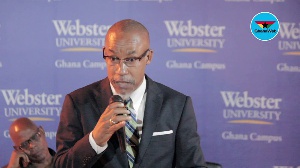Political Science and Public Policy Professor at the University of Missouri-St. Louis, Jean-Germain Gros, has said that in order to end the exploitation of Africa’s natural resources to sustain the economies of their former colonies, African leaders must come together to build African-centric economies.
He explained that an effective Africa-centric economy would require that raw materials such as cocoa, minerals and wood be processed into finished products in Africa rather than sold in raw forms at generally low prices to the continent’s detriment.
Prof. Gros spoke at the first Public Lecture Series for the year 2018 at the Webster University Ghana Campus. The theme for the lecture held Thursday was “The Politics and Economics of Neo-Colonialism in Post-Independent Africa”.
Addressing ‘Economics of Neo-Colonialism in Post-Independent Africa’, he said “one of the most harmful effects of the colonization (and by extension that o neo-colonialism) took place in the food production subsector of African agriculture.”
According to him, there are very few African countries that are self-sufficient in food production, in spite of the potentialities for most of them to be just that,” he hinted.
He, therefore, cited that a complete turnout in economic policy and philosophy in Africa can only be realized when a number of continent-wide agricultural policy changes in land tenure, farmer access to credit, government subsidies and protection against grain import such as rice. This way, he said, Africa can most likely resist the neoliberal agendas of the World Trade Organisations (WTO) because “in unity lies strength.”
Using China as an example, as the world’s number one importer of grains, Professor Jean-Germain Gros further asserted that Africa should be “self-sufficient” in “value-added food production which should be undertaken by African firms committed to the development of the continent. In other words, firms that will not leave upon the first signs of economic downturn.
“In the end, the economics of neocolonialism must be replaced by the economics of African nationalism, which is to say, Pan-Africanism. This will require a sea change policy, and more importantly, mentality. This work must begin now and cannot wait.” He concluded.
General News of Friday, 26 January 2018
Source: www.ghanaweb.com

















